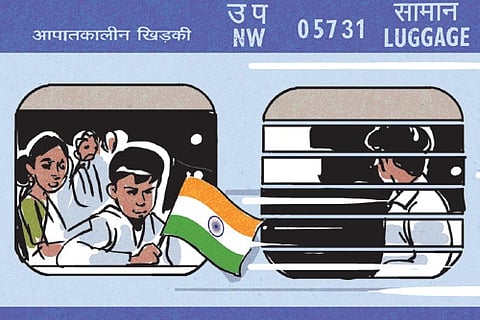Soft power: The Indian way
The Lord’s cricket ground, with its manicured green fields and the faint echo of polite applause, is very British. This was where I found myself, standing on the same balcony where Sourav Ganguly, years ago, had made a spectacle of himself, baring his torso and whirling his shirt like some tribal war flag.
That shirt now rests, preserved, in the Lord’s Museum—a relic of some shared colonial nostalgia. I was tempted to do something dramatic like a full Ganguly, but it was England, and the sky was grey, the air damp—so I settled for waving my muffler. It was my polite, understated way of expressing that cricket, politics, and management form the triumvirate of India’s soft power.
A member of the Indian Parliament confessed to me over a cup of masala chai: “You cannot miss a single marriage or funeral in your constituency.” These are high-stakes events that bring about an emotional catharsis. The voter will remember your absence and get even with you through the ballot box.
Politics here is not about policy but emotion, not about vision but the ability to navigate a minefield of fragile egos. The old rallying cries of roti, kapda, makan (bread, clothing, housing) no longer suffice. Today, there must be an addition of makkhan (butter)—the soft lubrication of rhetoric to ease the voter’s anxieties. The art is in the softening, in reducing the harsh edges of truth until it melts sweetly on the tongue.
One sees this same wielding of soft power in India’s hotel industry. The check-in clerk will rarely ask when you are departing—that would be a grave breach of the Indian ethos of atithi devo bhava (the guest is god). How can one, after all, ask a god when he intends to leave?
And when the inevitable departure does come, the doorman, with a deftness learnt from long practice, will juggle your bags, hold open your car door, and still extend a third, invisible hand, with fingers outstretched for a tip. It is a performance of polite pleading, perfected over years. His moustache dances, his eyebrows arch; the entire face, a silent pantomime of unspoken request.
Now, if you really want to see soft power in action, just take a train across India. It’s a rolling social experiment. You can hear a great bonhomie over the aroma of shared food. The carnivorous Calcuttans cohabit with Chennai-bound strict vegetarians. Adjustment is the name of the game. You can spot a man sipping whiskey hidden inside a soft drink bottle. First the man takes the drink, then the drink takes the man. He then rattles you with a calamitous laughter that sounds like a train passing on a railway bridge.
One out of every six people in the world is crammed within the borders of India. Here, mere capability is not enough; one must possess copability, the ability to bend, to twist, to find a way through the labyrinth of circumstances. The world, whether it’s in the back rooms of Westminster or the slick boardrooms of Silicon Valley, is starting to notice that India’s way of doing things—this strange, quiet, persistent power—is winning the long game. This quiet force of Indian resilience—a power that is neither loud nor forceful, but which, in its subtlety, is profoundly unyielding like the flowing Ganga.
Debashis Chatterjee
Author, Professor & Director, IIM Kozhikode
successsutras@gmail.com

